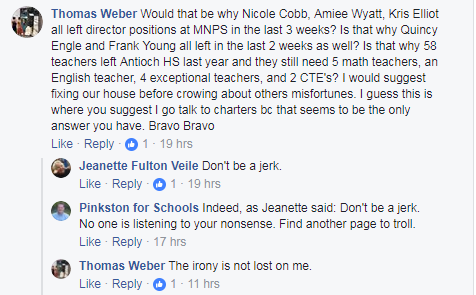How much are MNPS teachers paid relative to their peers in similar districts? This was a question I attempted to answer two years ago. The results then were discouraging. They clearly indicated MNPS needed to do much more in terms of compensation for educators.
The question of the adequacy (or, rather, inadequacy) of MNPS teacher compensation is relevant again in light of a recently published study in Business Insider. Here’s the key finding:
It takes a salary of $70,150 to live in Nashville today.
Here’s how they came up with that number:
Live comfortably factors include housing, groceries, utilities and health insurance premiums. Monthly costs were totaled and multiplied by 12 to get the annual dollar cost of necessities in each city. This dollar amount for necessities was then doubled to find the actual annual income needed to live comfortably in the city, assuming a person is following the 50-30-20 budgeting guideline, which requires an income double the cost of necessities. This study also compared the amount of income needed in each city to each city’s actual median pretax household income, according to the latest U.S. Census Bureau data. The amount of money specified for savings is equal to 20 percent of the total income needed, and the amount specified for discretionary spending is equal to 30 percent of the total income needed.
And, I’m going to point out again:
It takes a salary of $70,150 to live in Nashville today.
So, how are Nashville’s teachers doing in the “live comfortably” index? Not so good.
Teachers in Nashville will receive a 3% raise this year, so that’s positive. Getting to that point did take some back and forth between the School Board and Mayor Barry, but it got done. However, it’s not nearly enough to get them to a “comfortable” salary. Or even one that is competitive with similar cities.
In my 2015 analysis, I compared Nashville to a number of similar cities. For this case, we’ll look at Louisville, Kentucky. It’s roughly the same size, has slightly more students, and is just a few hours away. A teacher graduating from MTSU or Western Kentucky could reasonably look at jobs in Nashville and Louisville and be close to friends and family in either city.
Teachers in Nashville start at $42,100 with a bachelor’s degree. In Louisville, they start at $42,700. So, starting pay in Nashville is competitive. But, let’s look longer term. That same teacher after 10 years in Nashville will earn $47,000. In Louisville, it’s $54,974.
Oh, and let me note this: The salary to live comfortably in Louisville is $49,000. Teachers in Louisville hit that pay rate by year 5. A teacher in Nashville isn’t making $49,000 even after 10 years of experience. The pay scale in Nashville simply isn’t moving up quickly enough.
So, what about after 20 years? A Nashville teacher with a bachelor’s degree and 20 years experience makes $56,000. In Louisville, that teacher makes $71,000. A teacher working in Louisville with 20 years experience earns $22,000 more a year than that city’s “comfortable living” salary. In fact, they earn more than Nashville’s “comfortable” salary.
How about the top of the pay scale? At year 25, a Nashville teacher earns $57,000. In Louisville, it’s just over $72,000.
Some may note that teachers often earn advance degrees over the course of their career and that boosts pay. That’s true. So, a teacher with a master’s degree working in Nashville earns $62,600 at the top of the scale. In Louisville, it’s $78,000.
Imagine working for 25 years in the same profession, earning an advanced degree in your field, and making $7000 less than the “comfortable living” salary for your city? That’s what’s happening in MNPS.
One more note: If Nashville teachers want to come closer to the comfortable living salary, they could make their home in Nashville and commute to Williamson County, where teachers at the top of the scale with a bachelor’s degree earn just over $61,000 — or $4000 more than Nashville teachers. Got a master’s degree? You can earn just over $65,000 at the top of Williamson County’s scale.
Attracting and retaining teachers will become increasingly more difficult if MNPS doesn’t do more to address the inadequacy of it’s salaries. The system was not paying competitively relative to its peers two years ago, and Nashville’s rapid growth has come with a rising cost of living. Does Nashville value it’s teachers enough to pay them a comfortable salary? Or, will Nashville let cities like Louisville continue to best them in teacher compensation?
 For more on education politics and policy in Tennessee, follow @TNEdReport
For more on education politics and policy in Tennessee, follow @TNEdReport





